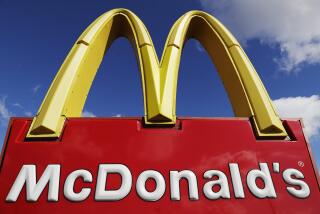Wider Role for Blacks Pledged by McDonald’s
After nine months of negotiations, the National Assn. for the Advancement of Colored People has reached an agreement with McDonald’s restaurants that is expected to increase substantially the number of minority franchise owners and funnel an additional $110 million or more into the black community over the next five years.
The agreement--announced Saturday by the NAACP and McDonald’s officials at a news conference in New York--calls for the nation’s largest fast-food chain to establish 100 new black-owned restaurants over the next four years, appoint more minority personnel to management and administrative positions and increase business with minority construction contractors and black-owned firms providing legal, financial, advertising and public relations services.
A ‘Step Forward’
“This was a very substantial step forward,” Raymond Johnson Jr., president of the Los Angeles chapter of the NAACP, said of the agreement. “What I would like to see is other corporations that identify with McDonald’s success . . . change their attitudes like McDonald’s did.”
Robert Beavers, senior vice president and member of the board of McDonald’s, characterized the agreement as a “strong reaffirmation” of the chain’s commitment to minority involvement, rather than a change in attitude.
“We feel we have an enviable track record in minority financial development,” Beavers said, stating that 9.5% of the chain’s franchises presently are black owned and 14% are minority. “We think this agreement will assist us in making a fine record better,” he said.
However, top McDonald’s officials previously had shown reluctance to sign “fair-share” pacts that require corporations to negotiate employment and financial investment goals with civil rights organizations, and this is the first time the chain has done so.
Negotiations on the agreement were spearheaded by leaders of the Los Angeles NAACP, which called for a boycott of McDonald’s products in April, contending the fast-food chain discriminated against blacks in its hiring, purchasing and franchising policies. The boycott was lifted after three days when McDonald’s officials--meeting with top NAACP representatives in Mayor Tom Bradley’s office--agreed to discuss the civil rights group’s concerns.
Other Groups Gain
Unlike other agreements negotiated by the NAACP, the McDonald’s pact benefits other minorities by increasing employment and franchise-ownership opportunities for Latinos and Asians as well as blacks.
The agreement calls for McDonald’s to study sales and revenue figures and explore the availability of minority vendors and professional firms, with the goal of establishing additional specific quotas by the end of 1986.
Under terms of the five-year agreement, McDonald’s will:
- Seek qualified minorities and prepare them to purchase and manage franchises, until the pool of franchise applicants is at least 25% to 30% minority. (There is often a waiting list two or three years long for franchise ownership.)
- Establish 100 new black-owned restaurants over the next four years. (There currently are about 300 black-owned McDonald’s restaurants, Beavers said.)
- Increase the number of minority employees and appoint more minorities to management and administrative positions.
- Establish a minority purchasing program to increase opportunities for minority vendors to supply restaurants with food, packaging and services.
- Increase corporate contributions to black community projects.
- Increase expenditures with black-owned professional firms, such as advertising agencies, insurance companies, law firms and banks.
- Use black construction firms for $25 million worth of construction and renovation projects at restaurants during the next two years.
- Appoint a group of NAACP and McDonald’s officials to monitor the success of the agreement.
Beavers said the franchises now operated by blacks currently generate “more than a third of a billion dollars a year,” and the addition of 100 new shops should increase business proportionately--”easily more than $100 million a year more.”
Applauded by Bradley
Informed of the pact announced Saturday, Bradley said he was “ecstatic” and called the pact “a historic agreement. . . .
“I’m confident the agreement will enhance economic investments in minority communities, open up job opportunities for blacks and other minorities, as well as aid minority-owned businesses,” Bradley said.
Johnson said the pact will benefit the restaurant chain by enhancing its image in minority communities and will benefit the NAACP by giving the group more clout in future negotiations with major companies.
“The emphasis on economic reciprocity has paid off and the branch now plans to target other local corporations and industries which are not good corporate citizens,” Johnson said.
Banks Are Targeted
The first target will be Los Angeles banks and savings-and-loan firms, Johnson said. He said the association will examine employment and loan practices that it considers discriminatory against blacks, and it will pressure financial institutions to withdraw investments in South Africa and stop closing branches in minority neighborhoods.
“I think we’ll find less resistance to what we’re going to be proposing because of our success with McDonald’s and with Coors,” said NAACP attorney Melanie Lomax, who helped negotiate the McDonald’s pact and the NAACP’s “fair-share” agreement last September with the Adolph Coors Co.
The $325-million agreement with the Colorado brewery requires Coors to spend up to 10% of its budget with black-owned businesses, bring more blacks into management and increase company contributions to black community projects over the next five years.
Lomax said Coors already has granted two new beer distributorships to blacks, deposited $2.6 million in 20 black-owned banks, awarded 180 contracts to black-owned businesses, hired a black advertising agency and established scholarships for black students.
Fixed Percentages
Unlike the Coors pact, which ties the amount of money Coors must spend in compliance to the company’s market share in the black community, the McDonald’s pact will not be based on a sliding scale, but will set fixed percentage goals, Lomax said.
The NAACP’s inquiry into McDonald’s franchise practices was prompted by a lawsuit filed in 1983 by a black franchise owner who charged that McDonald’s discriminated against him by not allowing him to purchase new outlets in non-minority neighborhoods.
From the start, McDonald’s officials denied that the company ever imposed geographical restrictions or limited the number of stores blacks could own.
NAACP officials credited Bradley with helping to break a deadlock that developed between McDonald’s and NAACP leaders early in the negotiations.
After the NAACP took out full-page newspaper ads promoting its April boycott, Bradley interceded to meet separately with NAACP and McDonald’s officials, then arranged a meeting between the two sides. Further meetings followed over the next nine months.
Earlier Leader’s Project
The McDonald’s campaign was the last major project launched by former Los Angeles NAACP President John McDonald, who died in December.
“This was John’s baby, and we all feel a great sense of regret that he is not here to see this part of it,” Lomax said. “His legacy is that he was fearless about taking on corporate America. It didn’t really matter to him whether it was a McDonald’s or a ‘Ma and Pa’ store; the principle was the same.”
The Los Angeles chapter has been among the most aggressive of the NAACP’s branches in negotiating “fair-share” agreements, voluntary pacts that call for companies to invest in black communities an amount equal to the percentage of profits they earn from sales in black communities.
The NAACP, nationally and through its local chapters, has negotiated 17 such agreements, but the Los Angeles chapter has been the only branch to use boycotts to force negotiations, and both its campaigns--against McDonald’s and Coors--have succeeded.
More to Read
Inside the business of entertainment
The Wide Shot brings you news, analysis and insights on everything from streaming wars to production — and what it all means for the future.
You may occasionally receive promotional content from the Los Angeles Times.










